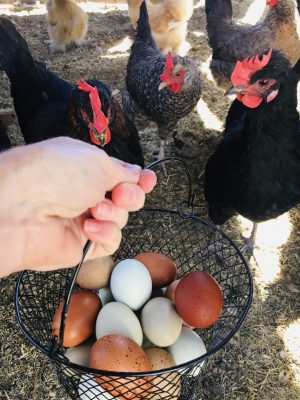
While it may seem that chickens attract rats, they actually do not. It is the environment surrounding chickens that can attract rats. Uneaten and improperly sealed chicken feed, clutter, debris, long grass around the chicken run and not maintaining chicken chores, such as collecting eggs and cleaning chicken poop is what will attract rats.

Let’s get into a little bit more detail as to the safety aspect of rats and chickens coming into contact with each other as well as what you can do to prevent rats from visiting in the first place.
Will Chickens Attract Rats?
As a chicken keeper, you know that it isn’t uncommon to encounter signs of a rat infestation and worry about the safety of your flock. You might wonder, “Will my chickens kill the rats?” or “Would a rat kill my chickens?” and “Will rats make my chickens sick?”
I will answer all of these questions and also go into detail as to what you can do to minimize the problem of rat infestations in the first place. Keeping your flock safe is important!

Will Chickens Kill Rats?
Yes, chickens will kill and eat rats! They are more likely to go after the smaller ones. They will also eat mice, voles, lizards, frogs and whatever else looks tasty that goes running through their field of vision during the day. Rats will, for the most part, keep a distance from chickens if they feel they are at risk of being attacked themselves.
Instead, rats will wait until the dark evening hours and attack a chicken while they are roosting at night.
Would a Rat Kill a Chicken?
Rats generally are not after chickens, but if food is scarce and they have access to them, they have been known to attack, kill and eat them. They have even been known to nibble on chicken toes if they can get to them while roosting at night. Baby chicks and uncollected eggs are at the highest risk.

This is why it is important to make sure that you have enough roosting space up high enough to deter rats from attacking while they are sleeping. Better yet, have a door on your coop that securely shuts at night, not allowing rats to get in.
Do one final egg collection right before dusk too. Rats can’t pick chicken eggs up, but they can roll them from place to place or chew a hole in one end and drag it away with its teeth.
Chickens are at higher risk of attack by rats in the night for a few reasons. They go into a trance in the night when they are roosting and will not be alert enough to fend off a predator. They are also night blind, having very few rods (photoreceptor cells in the retina) which help to provide better eyesight in low lighting.
Can Rats Make Chickens Sick?

Yes, rats can make chickens very sick. They carry many parasites and diseases that can be transmitted to humans. This is why it is so important to do what it takes to keep rats out of the coop.
Rats leave urine, feces and saliva where they visit and this can easily transmit to your chickens that are walking and eating off the ground.
Many of these diseases can be transmitted through feces. Take extra precaution when cleaning the chicken coop. It is always best to wear a respirator so you will not breath in an harmful disease causing spores.
Chicks and chickens may look healthy on the outside, but still carry disease. This is why your should always wash your hands before and after handling chickens and thoroughly cook your chicken eggs.
| PARASITES & DISEASES CAUSES BY RATS |
|---|
| MITES |
| LICE |
| FLEAS |
| TICKS |
| HANTAVIRUS |
| SALMONELLA |
| LYMPHOCYTIC CHORIOMENINGITIS VIRUS (LCMV) |
| HEMORRHAGIC FEVER |
| PLAGUE |
| LEPTOSPIROSIS |
| RAT BITE FEVER |
| LISTERIA |
| CAMPYLOBACTER |
| TULAREMIA |
Does Chicken Wire Keep Rats Out?
No, 3/4″-2″ chicken wire will not keep rats out of the chicken coop. Smaller rats can also fit through 1/2″ holes. Chicken wire is effective in keeping chickens in, but is too wide of a material to keep many predators out. You need to have a material that is 1/4″ or smaller to prevent rats from getting in.

Consider getting 1/4″ hardware cloth instead. Hardware cloth is a mesh of galvanized, stainless steel or bare steel wires. It is hard and small enough that rats, mice and other rodents cannot chew or fit through. Most snakes cannot fit through 1/4″ hole.
What Are Signs of a Rat Infestation in a Chicken Coop?
| SIGNS OF RAT INFESTATION IN A CHICKEN COOP |
|---|
| MISSING CHICKEN FEED |
| MISSING CHICKS |
| MISSING EGGS |
| CHEW HOLES IN COOP |
| CHEW HOLES IN FEED BAGS |
| RAT DROPPINGS |
| SCRATCHING NOISES |
| NESTING MATERIAL |
| MUSKY URINE SMELL |
How Do You Keep Rats Away from Chickens?

The number one thing that you can do to keep rats away from chickens is to keep the environment that the chickens are in clean, followed by making sure rats are not able to get into the chicken coop. This includes putting away all uneaten feed and collecting eggs at the end of each day as well as regularly cleaning up the chicken poop.
Rats are always looking for a nice little feast and chicken coops are often a 24 hour dine in restaurant for them. An open chicken coop door or a broken board with access into the coop is an open invitation to make a nice nesting spot and to warm up.
Rats are attracted to the smells of chicken feed and manure and in the evening hours don’t mind nibbling on some chicken feet or attacking and killing them, if they are hungry enough.
Below is a list of the top things you can do to deter rats from hanging around your chickens.
| TIPS TO DECREASE RATS FROM VISITING YOUR PROPERTY |
|---|
| LOCATE THE COMPOST PILE AWAY FROM THE CHICKEN COOP. |
| DON’T STORE CHICKEN FEED CLOSE TO THE COMPOST PILE. |
| COMPOST PILE SHOULD BE IN WIDE OPEN AREA, WITHOUT CLUTTER. |
| RAISE COMPOST BINS OFF THE GROUND TO DETER RODENTS THAT LIKE TO BURROW. |
| IF YOU HAVE HAD A RAT INFESTATION, YOU WILL NEED TO THOROUGHLY CLEAN THE AREA TO DETER OTHER RODENTS FROM VISITING. RATS LEAVE URINE SCENT BEHIND THAT ENTICES OTHER RODENTS TO VISIT. |
| BURY FOOD SCRAPS AT LEAST 6″ AND COVER WITH FRESH COMPOST. |
| DON’T THROW FRESH MEAT OR DAIRY PRODUCTS INTO THE PILE. |
| TAKE IN ALL PET FOOD AT SUNDOWN.(DAILY) |
| PICK ALL FRUIT FROM TREES AS IT RIPENS. |
| PLACE YOUR COMPOST BIN ON EITHER CONCRETE OR A SAND BASE. |
| PUT AWAY ANY UNEATEN FOOD (DAILY) |
| STORE CHICKEN FEED IN METAL LOCKED CONTAINERS (DAILY) |
| WASH FOOD BOWLS (DAILY) |
| COLLECT EGGS AT SUNDOWN (DAILY) |
| REMOVE WATER (DAILY) |
| CHANGE NESTING BOX BEDDING (WEEKLY) |
| DISPOSE OF CHICKEN POOP AWAY FROM COOP (WEEKLY) |
| REPLACE COOP BEDDING (WEEKLY) |
| SCRAPE COOP POOP OFF WALLS (BIANNUAL) |
| HOSE DOWN/SANITIZE COOP (BIANNUAL) |
The second important thing to do is to predator proof your chicken coop. Remember, chicken wire will keep your chickens in, but it will not protect it from predators that can get in. Many predators can get through and take down chicken wire without a problem.
Instead, use 1/4″ hardware cloth, this is both strong enough and the diameter small enough that predators cannot break or pass through.
Consider getting an automatic coop door that automatically goes down at a designated time or at sundown. If you do not have an automatic door, it is critical to make sure that you lock your flock in at night. Night time is when many predator attacks occur.

The following is a list of the top ways you can help protect your chickens from rats and other rodents:
For more tips on how to protect your chicken coop from rats and other rodents, read my article, 13 Simple Ways to Rodent Proof the Chicken Coop





Hi Nice site https://google.com